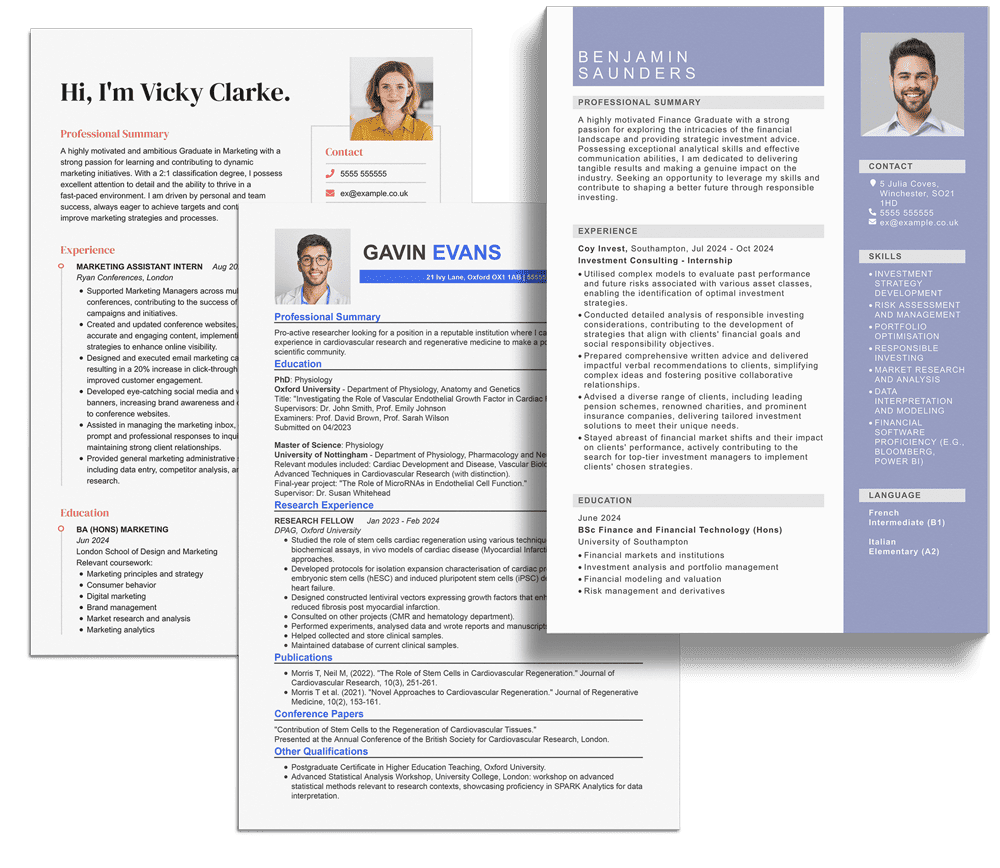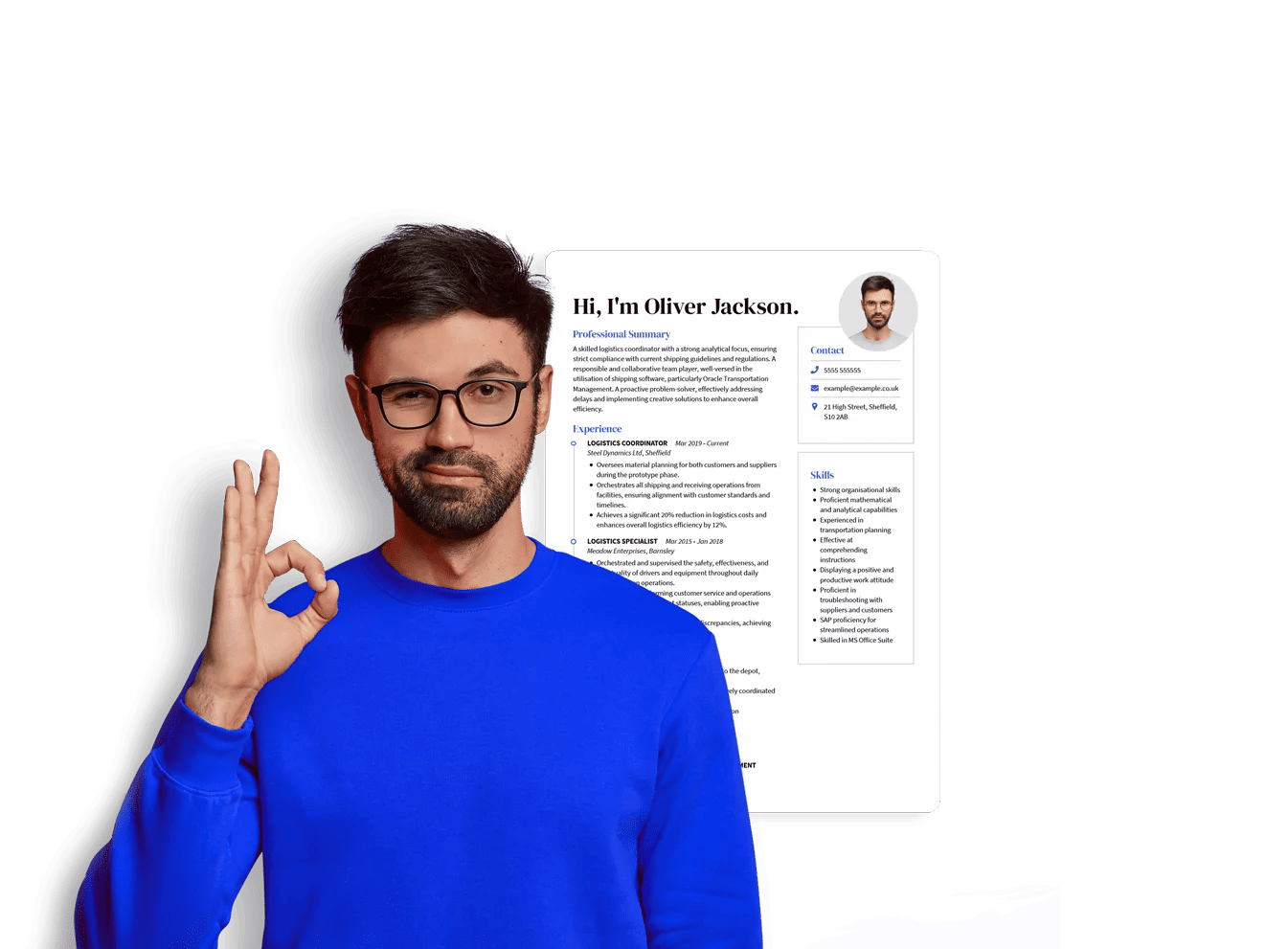Selecting the ideal CV format can significantly enhance your chances of getting noticed by potential employers. Each format serves a unique purpose and caters to different circumstances. Here’s a breakdown to help you decide which layout is most suitable for your UK graduate CV:
Chronological CV format
Often the most familiar style, a chronological CV lists your work experience in reverse chronological order. It is incredibly beneficial if you have a clear and linear job history with steady progression in a particular field. This format highlights your professional growth and is easy for recruiters to follow.
Skills-based CV format
A skills-based or functional CV emphasises your abilities and accomplishments rather than your chronological work history. It’s ideal if you’re a recent graduate with limited work experience, have gaps in your employment, or are changing career paths. It allows you to showcase the transferable skills and qualifications that are relevant to the job.
Combined CV format
For those who want the best of both worlds, a combined, also known as a hybrid CV, format merges elements of both chronological and skills-based CVs. You’ll have the opportunity to equally highlight relevant skills and your work history. This format is particularly fitting if you have a few years of work experience and a strong set of specialised skills.
For a young graduate in the UK, a skills-based CV format may be the most advantageous route to take. Fresh out of university, you may not have a lengthy employment history or a clear professional progression to feature.
The skills-based format allows you to concentrate on your academic achievements and the skills you’ve acquired that are pertinent to the job you’re applying for. It provides the opportunity to emphasise project work, extracurricular activities, and any internships or placements which have afforded you relevant experience.
By focusing on your abilities and what you can bring to the role, you sidestep the potential disadvantages of limited work history and underscore the qualities that make you an excellent candidate.
Finally, in terms of presentation, the formatting of your graduate job CV is just as critical as its format. Follow the guidelines below to ensure optimal readability:
Can’t bother keeping track of all this? Check out this selection of CV templates and pick a graduate CV template that follows all of the best practices in your industry of choice.
How to write a graduate CV
As you write your CV, you want to present a polished picture of your academic and professional potential.
Here are the key sections that should form the skeleton of your document:
- Contact details
- Personal statement
- Education
- Work experience
- Skills
Keep reading to learn how to tailor each section to reflect your unique profile.
Contact details
While this may seem obvious, it’s easy to overlook the importance of presenting accurate contact information. Include your name in a large, bold font at the top of your CV. Then list your contact number and professional email address.
You can also add a CV headline. It should be the same as the job title you’re targeting, positioned at the very top of your document, just under your contact details.
Correct
John Chase
123 Apple Lane | Anytown, ST 12345
(123) 456-7890 | john.chase@email.com | linkedin.com/in/johnchase
Social Media Marketer
Incorrect
Johnny C.
Anytown, by the park side
Call me anytime: 1234567890
Contact me on my email: johnnylikespizza@yahoo.com
Pro tip
Avoid using personal email addresses or nicknames that appear unprofessional. Instead, use a simple combination of your first and last names and opt for a reputable email provider such as Gmail or Outlook. You can also include a link to your LinkedIn profile or portfolio if relevant.
Personal statement
The CV personal statement or CV profile section allows you to introduce yourself and present a compelling narrative that captures the essence of who you are as a professional. It should be brief, no more than 2-3 sentences and highlight your career aspirations, key skills, and unique selling points.
Correct
Recent marketing graduate with a passion for digital media and data analysis. Adept at creating engaging social media campaigns that drive brand awareness and increase website traffic. Seeking an entry-level position in a dynamic marketing team where I can leverage my skills to contribute to business growth.
Incorrect
Recent grad. Loves marketing & social media. Really good at making people like posts and visit sites. Need a job to do cool marketing stuff and grow the business.
Education
The Education section is a fundamental part of your graduate CV, where you outline your academic credentials and any relevant coursework or research. It’s particularly important for recent graduates, as it often represents the bulk of your qualifications and can demonstrate the knowledge and skills you’ve developed that align with the role you’re targeting.
Highlight your university degree, school grades, institution, graduation dates, relevant modules and any honours or distinctions you’ve achieved. This information helps employers quickly assess your academic background and its relevance to the job at hand.
Correct
2017-2021
Bachelor of Science in Computer Science
University of Technology – Anytown, AT | September 2017 – June 2021
Achieved a First-Class Honours degree.
Completed a capstone project on artificial intelligence that resulted in a scholarly article.
Relevant coursework: Machine Learning, Algorithms, Data Structures, and Database Management.
Incorrect
Bachelor
University – Anytown
Did lots of coding.
Wrote a great essay about AI.
Work experience
The Work experience section of your graduate CV plays a crucial role in presenting your professional background to potential employers. It should help bridge the gap between your academic achievements and the practical application of your skills in the real world.
Consider it an opportunity to demonstrate how your experiences—whether in part-time jobs, internships, or volunteer work—have equipped you with competencies sought after in the workplace.
For recent graduates, the challenge often lies in the perceived lack of professional experience.
How can you overcome it? That’s simple: remember that all experience is valuable. Draw attention to any role in which you’ve showcased transferable skills, such as teamwork, communication, leadership, or problem-solving.
Remember to focus on quality over quantity; it’s about presenting the experiences you have in the most relevant and compelling way.
Here’s how to structure your experiences:
Correct
June 2020 – August 2020
Marketing Intern | XYZ Corporation, Anytown, AT
- Collaborated with the digital marketing team to develop and implement a social media strategy that increased engagement by 25%.
- Assisted in the analysis of campaign data to understand consumer behaviour and improve future marketing efforts.
- Communicated with external agencies to coordinate advertising and marketing campaigns.
Incorrect
Intern at XYZ
Worked with the social media team and helped out with campaigns.
Pro tip
Even positions seemingly unrelated to your desired field can be framed in a way that highlights your suitability for the job you are applying to. When detailing each position, start with a strong action verb and quantify your achievements when possible to provide a clear and impactful narrative of your professional journey thus far.
Skills
In this section you want to highlight specific skills which are relevant to the job description; these might include professional qualifications, hard skills or soft skills.
Be honest and only include useful skills that you possess or are currently developing.

When crafting this section of your graduate CV, consider including competencies that are universally valued across various industries, such as:
- Analytical thinking: the ability to analyze complex information and make sound decisions.
- Effective communication: the ability to convey ideas clearly and concisely, both verbally and in writing.
- Teamwork: the ability to collaborate with others towards a common goal, including effective conflict resolution skills.
- Time management: the ability to prioritise tasks, meet deadlines, and manage workload efficiently.
- Adaptability: the ability to adjust and thrive in new situations, including a willingness to learn and embrace change.
Other technical or interpersonal skills that may be relevant to your specific field of study or desired job role should also be included. Remember to provide examples or anecdotal evidence of how you have utilised these skills in past experiences.
Correct
- Proficient in Microsoft Excel, Google Analytics, and social media management platforms (Hootsuite, Buffer)
- Fluent in Spanish and proficient in French
- Strong analytical skills with experience using data to drive decision-making
- Excellent written and verbal communication skills developed through coursework and extracurricular activities
Incorrect
- Knows some Excel and can kinda read Spanish
- Analytical thinker with great communication skills
- Presentation skills
Pro tip
Avoid using generic terms like “good communicator” or “team player”. Instead, provide concrete examples of how you have demonstrated these skills in past experiences. Also, be honest about your proficiency level; don’t oversell yourself on skills you are not confident in.
Should you add additional sections to your graduate CV?
Depending on relevancy, you may want to include sections for certifications, publications, volunteer work, or hobbies and interests.
By strategically organising these sections, your CV will not only reflect your individuality and qualifications but will also be tailored to showcase how your profile fits with prospective employers’ requirements. Crafting your graduate CV with care and attention to these details can be a pivotal step in launching your professional journey.
Remember however that adding sections to your graduate CV should never be viewed as a method to simply “fill space.” Each segment included needs to serve a distinct purpose, offering clear insight into your capabilities and how they relate to the job you’re applying for.
Incorporating areas such as certifications, publications, or volunteer experience can set you apart from other candidates, but only if they genuinely reflect your skills, interests, or professional development.
Remember, a carefully curated CV that presents a strategic, concise portrayal of your background will always make a stronger impression than one padded with irrelevant information.
Here are some of the additional sections frequently found on graduate CVs:
- Certifications: Relevant certifications can demonstrate your expertise in a specific field or software.
- Publications: If you have written publications such as articles, books, or academic papers, they can add credibility to your profile.
- Volunteer work: The Volunteer work section showcases your commitment to giving back and highlights valuable skills such as teamwork, leadership, and time management.
- Hobbies and interests: Including extra-curricular activities can provide a glimpse into your personality and highlight skills such as creativity, determination, or adaptability.
- Achievements and awards: Mention any academic or extracurricular accolades that can set you apart as a high-achiever or a leader.
- References: If you choose to include this section, make sure to have at least two professional references who can speak about your work ethic and skills. These can be former professors, supervisors from internships or previous employers.
Write a cover letter to go with your graduate CV
In a job market as competitive as the UK, attaching a covering letter to your graduate CV is strongly recommended.
Feels like yet another formality? Not quite! It’s a great opportunity to enrich your profile, demonstrate your enthusiasm for the role, and explain why you are the ideal candidate.
A cover letter and CV that match in look and feel, style of writing and branding will show your potential employers that you are detail-oriented, consistent, and invested in the application process.
They should complement each other, with the cover letter expanding on key experiences and achievements highlighted in the CV, allowing for a compelling and cohesive personal brand.
Need help crafting yours? Check out our cover letter builder!


